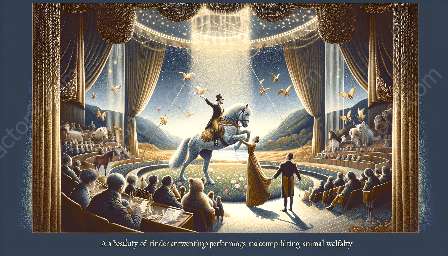Music has always played a vital role in enhancing the awe and wonder of circus performances. The combination of acrobatics, magic, and stunts in the circus is amplified by the emotional and thematic impact of music. In outdoor circus settings, the challenges for circus musicians are unique, requiring them to adapt to environmental factors and integrate their performances seamlessly with the overall circus experience.
The Role of Music in Circus Performances
Before delving into the adaptation of circus musicians to outdoor settings, it's essential to understand the role of music in circus performances. Throughout history, the circus and music have enjoyed a harmonious relationship, with each enriching the other. The live music in a circus performance serves several critical functions:
- Setting the Mood: Whether it's evoking excitement, suspense, or joy, music sets the emotional tone of the performance.
- Enhancing the Acts: Music amplifies the impact of the various circus acts, heightening the audience's connection to the on-stage action.
- Creating Transitions: Smooth transitions between acts are facilitated by music, ensuring a seamless flow of the performance.
- Engaging the Audience: Music plays a vital role in engaging the audience and keeping them captivated throughout the show.
- Supporting Performers: Musicians provide rhythmic support and cues for performers, helping them stay synchronized and in tune with their routines.
The Unique Challenges of Outdoor Circus Settings
Performing in outdoor circus settings presents distinct challenges for musicians that differ from traditional indoor venues. These challenges include:
- Environmental Factors: Musicians need to adapt to outdoor conditions such as wind, temperature, and natural disturbances that can affect their instruments and overall sound quality.
- Acoustic Considerations: Outdoor spaces often lack the acoustics of indoor venues, requiring musicians to adjust their sound projection and instrument choices accordingly.
- Variable Performer Visibility: In outdoor settings, performers are often spread out over a wider area, making it essential for musicians to coordinate their music to ensure all acts are well-supported.
- Logistical Challenges: Setting up and transporting musical equipment in outdoor environments can pose logistical challenges for circus musicians.
- Instrument Selection: Musicians may choose specific instruments or amplification methods suitable for outdoor acoustics and environmental conditions.
- Rehearsal and Coordination: Musicians coordinate closely with circus performers to ensure their music aligns perfectly with the timing and tempo of the acts.
- Flexibility in Performance: Circus musicians adapt to unexpected environmental changes and the location of performers, adjusting their music on the fly to support the ever-changing dynamics of the show.
- Equipment Management: They employ innovative solutions to secure and protect their instruments from outdoor elements while maintaining the high quality of their performance.
Adapting to the Unique Challenges
Despite these obstacles, circus musicians demonstrate remarkable adaptability to ensure that the music seamlessly complements the circus arts in outdoor settings. This adaptation involves:
The Harmonious Connection between Circus Arts and Music
Despite the challenges, the relationship between music and circus arts in outdoor settings remains symbiotic. The adaptability and creative solutions of circus musicians enhance the overall impact of the performance, emphasizing the harmonious connection between circus arts and music. Their ability to seamlessly integrate captivating music into the spectacle of outdoor circus settings elevates the audience experience and solidifies the enduring role of music in the mesmerizing world of the circus.


































